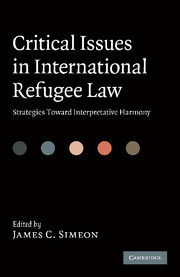Book contents
- Frontmatter
- Contents
- Notes on contributors
- Foreword by Justice Tony North
- Acknowledgements
- Introduction
- Chapter 1 From refugee to judge of refugee law
- Chapter 2 Individual risk, armed conflict and the standard of proof in complementary protection claims:
- Chapter 3 Running scared since 9/11:
- Chapter 4 Asymmetrical sovereignty and the refugee:
- Chapter 5 Economic harm as a basis for refugee status and the application of human rights law to the interpretation of economic persecution
- Chapter 6 The fragmented nature of the international refugee regime and its consequences:
- Index
- References
Chapter 3 - Running scared since 9/11:
refugees, UNHCR and the purposive approach to treaty interpretation
Published online by Cambridge University Press: 17 February 2011
- Frontmatter
- Contents
- Notes on contributors
- Foreword by Justice Tony North
- Acknowledgements
- Introduction
- Chapter 1 From refugee to judge of refugee law
- Chapter 2 Individual risk, armed conflict and the standard of proof in complementary protection claims:
- Chapter 3 Running scared since 9/11:
- Chapter 4 Asymmetrical sovereignty and the refugee:
- Chapter 5 Economic harm as a basis for refugee status and the application of human rights law to the interpretation of economic persecution
- Chapter 6 The fragmented nature of the international refugee regime and its consequences:
- Index
- References
Summary
States are not allowed to combat international terrorism at all costs. They must not resort to methods which undermine the very values they seek to protect. And this applies the more to those ‘absolute’ rights from which no derogation may be made even in times of emergency … Upholding human rights in the fight against terrorism is first and foremost a matter of upholding our values, even with regard to those who may seek to destroy them.
Introduction
Even today, the events of 11 September 2001 in New York City, Washington DC and near Shanksville, Pennsylvania cast a long shadow. Heightened states of alert typify the daily experience of many, especially those engaging in international travel. It is an inconvenience that leads to more time being spent in airport queues than is good for anyone. Nevertheless, travellers put up with it because somehow it makes them feel safer. However, for those seeking refugee status, the events of that day in 2001 have had much more serious consequences. Specific refugee restricting provisions and the more general restrictions imposed on all travellers have made obtaining asylum more difficult since 11 September 2001; despite the fact that not a single refugee was involved in the attacks on the World Trade Centre or the Pentagon. In spite of the fact that no refugee was involved, the international community, in the shape of the Security Council, immediately went on to link the threat of international terrorism with those seeking refugee status and intimated that the international protection of refugees could be used to facilitate terrorism.
- Type
- Chapter
- Information
- Critical Issues in International Refugee LawStrategies toward Interpretative Harmony, pp. 85 - 118Publisher: Cambridge University PressPrint publication year: 2010

